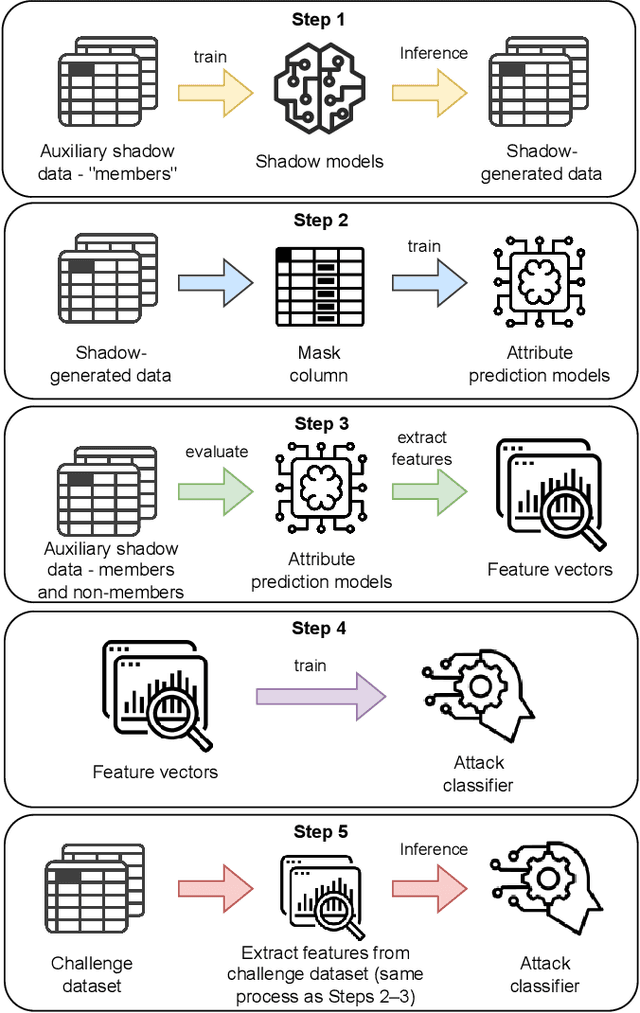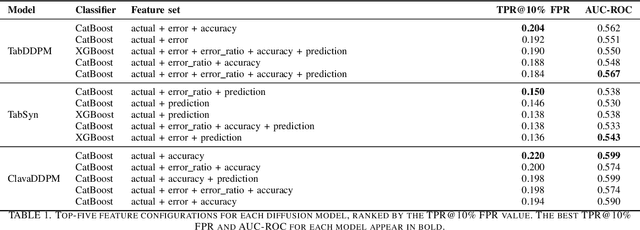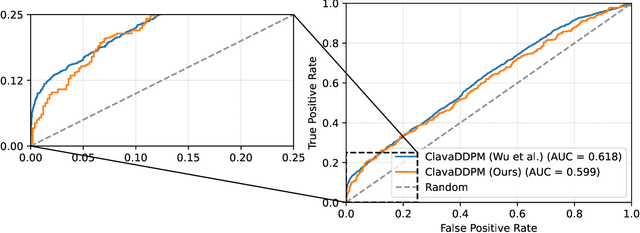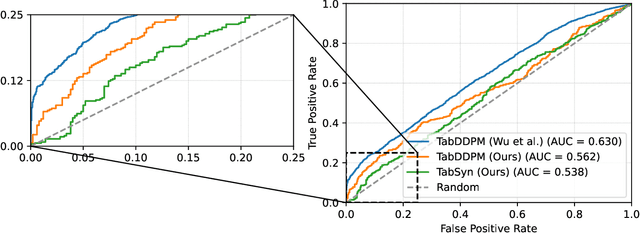Eyal German
MIA-EPT: Membership Inference Attack via Error Prediction for Tabular Data
Sep 16, 2025



Abstract:Synthetic data generation plays an important role in enabling data sharing, particularly in sensitive domains like healthcare and finance. Recent advances in diffusion models have made it possible to generate realistic, high-quality tabular data, but they may also memorize training records and leak sensitive information. Membership inference attacks (MIAs) exploit this vulnerability by determining whether a record was used in training. While MIAs have been studied in images and text, their use against tabular diffusion models remains underexplored despite the unique risks of structured attributes and limited record diversity. In this paper, we introduce MIAEPT, Membership Inference Attack via Error Prediction for Tabular Data, a novel black-box attack specifically designed to target tabular diffusion models. MIA-EPT constructs errorbased feature vectors by masking and reconstructing attributes of target records, disclosing membership signals based on how well these attributes are predicted. MIA-EPT operates without access to the internal components of the generative model, relying only on its synthetic data output, and was shown to generalize across multiple state-of-the-art diffusion models. We validate MIA-EPT on three diffusion-based synthesizers, achieving AUC-ROC scores of up to 0.599 and TPR@10% FPR values of 22.0% in our internal tests. Under the MIDST 2025 competition conditions, MIA-EPT achieved second place in the Black-box Multi-Table track (TPR@10% FPR = 20.0%). These results demonstrate that our method can uncover substantial membership leakage in synthetic tabular data, challenging the assumption that synthetic data is inherently privacy-preserving. Our code is publicly available at https://github.com/eyalgerman/MIA-EPT.
Tab-MIA: A Benchmark Dataset for Membership Inference Attacks on Tabular Data in LLMs
Jul 23, 2025Abstract:Large language models (LLMs) are increasingly trained on tabular data, which, unlike unstructured text, often contains personally identifiable information (PII) in a highly structured and explicit format. As a result, privacy risks arise, since sensitive records can be inadvertently retained by the model and exposed through data extraction or membership inference attacks (MIAs). While existing MIA methods primarily target textual content, their efficacy and threat implications may differ when applied to structured data, due to its limited content, diverse data types, unique value distributions, and column-level semantics. In this paper, we present Tab-MIA, a benchmark dataset for evaluating MIAs on tabular data in LLMs and demonstrate how it can be used. Tab-MIA comprises five data collections, each represented in six different encoding formats. Using our Tab-MIA benchmark, we conduct the first evaluation of state-of-the-art MIA methods on LLMs finetuned with tabular data across multiple encoding formats. In the evaluation, we analyze the memorization behavior of pretrained LLMs on structured data derived from Wikipedia tables. Our findings show that LLMs memorize tabular data in ways that vary across encoding formats, making them susceptible to extraction via MIAs. Even when fine-tuned for as few as three epochs, models exhibit high vulnerability, with AUROC scores approaching 90% in most cases. Tab-MIA enables systematic evaluation of these risks and provides a foundation for developing privacy-preserving methods for tabular data in LLMs.
LexiMark: Robust Watermarking via Lexical Substitutions to Enhance Membership Verification of an LLM's Textual Training Data
Jun 17, 2025Abstract:Large language models (LLMs) can be trained or fine-tuned on data obtained without the owner's consent. Verifying whether a specific LLM was trained on particular data instances or an entire dataset is extremely challenging. Dataset watermarking addresses this by embedding identifiable modifications in training data to detect unauthorized use. However, existing methods often lack stealth, making them relatively easy to detect and remove. In light of these limitations, we propose LexiMark, a novel watermarking technique designed for text and documents, which embeds synonym substitutions for carefully selected high-entropy words. Our method aims to enhance an LLM's memorization capabilities on the watermarked text without altering the semantic integrity of the text. As a result, the watermark is difficult to detect, blending seamlessly into the text with no visible markers, and is resistant to removal due to its subtle, contextually appropriate substitutions that evade automated and manual detection. We evaluated our method using baseline datasets from recent studies and seven open-source models: LLaMA-1 7B, LLaMA-3 8B, Mistral 7B, Pythia 6.9B, as well as three smaller variants from the Pythia family (160M, 410M, and 1B). Our evaluation spans multiple training settings, including continued pretraining and fine-tuning scenarios. The results demonstrate significant improvements in AUROC scores compared to existing methods, underscoring our method's effectiveness in reliably verifying whether unauthorized watermarked data was used in LLM training.
MoE-MLoRA for Multi-Domain CTR Prediction: Efficient Adaptation with Expert Specialization
Jun 09, 2025Abstract:Personalized recommendation systems must adapt to user interactions across different domains. Traditional approaches like MLoRA apply a single adaptation per domain but lack flexibility in handling diverse user behaviors. To address this, we propose MoE-MLoRA, a mixture-of-experts framework where each expert is first trained independently to specialize in its domain before a gating network is trained to weight their contributions dynamically. We evaluate MoE-MLoRA across eight CTR models on Movielens and Taobao, showing that it improves performance in large-scale, dynamic datasets (+1.45 Weighed-AUC in Taobao-20) but offers limited benefits in structured datasets with low domain diversity and sparsity. Further analysis of the number of experts per domain reveals that larger ensembles do not always improve performance, indicating the need for model-aware tuning. Our findings highlight the potential of expert-based architectures for multi-domain recommendation systems, demonstrating that task-aware specialization and adaptive gating can enhance predictive accuracy in complex environments. The implementation and code are available in our GitHub repository.
 Add to Chrome
Add to Chrome Add to Firefox
Add to Firefox Add to Edge
Add to Edge